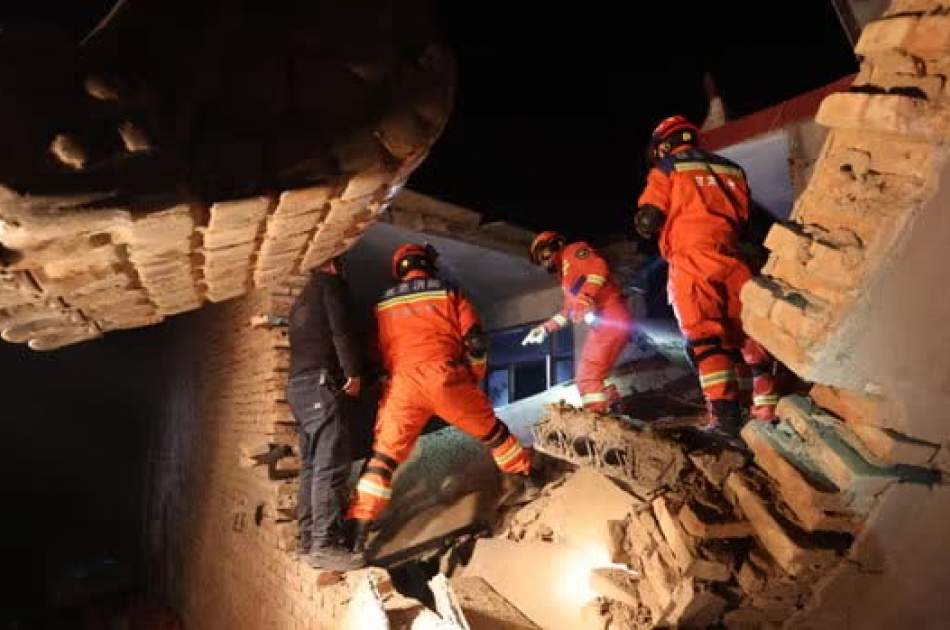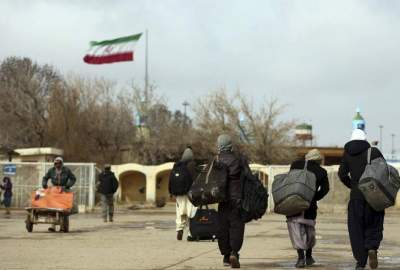Temperatures are as low as -16C in Gansu and Qinghai provinces, where the magnitude-6.2 quake struck on Monday.
Publish dateWednesday 20 December 2023 - 15:10
Story Code : 282570
Afghan Voice Agency (AVA) - Monitoring: The death toll from China’s earthquake has risen to 131, with almost 1,000 people injured, as rescuers dig through rubble in below freezing conditions.
The magnitude-6.2 earthquake struck just before midnight on Monday, in Jishishan County near the border of Gansu and Qinghai provinces, destroying or damaging more than 150,000 homes, according to state media. The quake, which was followed by several strong aftershocks, caused mud and landslides, and damaged power lines and other local infrastructure “to varying degrees”.
On Wednesday morning authorities said the official death toll had risen to 131 in Gansu with 782 injured, and 18 dead and 198 injured in Qinghai.
Amid a days-long cold wave sweeping across most of China, the high-altitude area in China’s north-west reported temperatures as low as -16C, hampering rescue efforts.
Responders, including 1,500 firefighters, 1,500 police officers, 1,000 PLA soldiers, and about 400 medics, continued to pull people from rubble and treat the injured. Authorities said 78 people had been rescued in Gansu but 20 people were still missing from two villages in Minhe County, where a mudslide swept through, and half-burying many buildings in brown silt. Search and rescue operations and efforts to resettle residents continued as state media footage showed bulldozers removing thick mud.
The frigid temperatures are expected to continue in the region but many residents are too afraid to return home, instead huddling around fires in open spaces.
“I just feel anxious, what other feelings could there be?” said Ma Dongdong, who noted in a phone interview with AFP that three bedrooms in his house had been destroyed and a part of his milk tea shop was cracked wide open.
Afraid to return home because of aftershocks, he spent the first night in a field with his wife, two children and some neighbors, where they made a fire to stay warm. In the early morning, they went to a tent settlement that Ma said was housing about 700 people. As of mid-afternoon, they were waiting for blankets and warm clothing to arrive.
The Gansu Provincial Seismological Bureau said strong aftershocks of magnitude 5 were still possible around the area in the coming days, based on the characteristics of the Monday quake, historical seismic activity and other factors.
Li Haibing, an expert at the Chinese Academy of Geological Sciences, said that the relatively high number of casualties in the latest quake was in part because it was shallow. “Therefore, it has caused greater shaking and destruction, even though the magnitude was not large,” he said.
Other factors include the quake’s mainly vertical movement, which causes more violent shaking; the lower quality of buildings in what is a relatively poor area; and the fact that it happened in the middle of the night when most people were home, Li said.
The remote and mountainous area is home to several predominantly Muslim ethnic groups and near some Tibetan communities. Geographically, it is in the center of China, though the area is commonly referred to as the north-west, as it is at the north-western edge of China’s more populated plains.
Within 50km of the epicenter on the side of neighboring Qinghai province, the earthquake affected 22 towns and villages, but of them, two villages suffered the worst damage.
On social media, discussion of the earthquake and rescue response were five of the top 10 trending topics on Weibo, with hundreds of millions of posts focusing primarily on the rescue efforts and volunteers attending the area with food and other assistance./Guardian
avapress.com/vdcd5x0xzyt0jk6.em2y.html
Tags
Top hits







